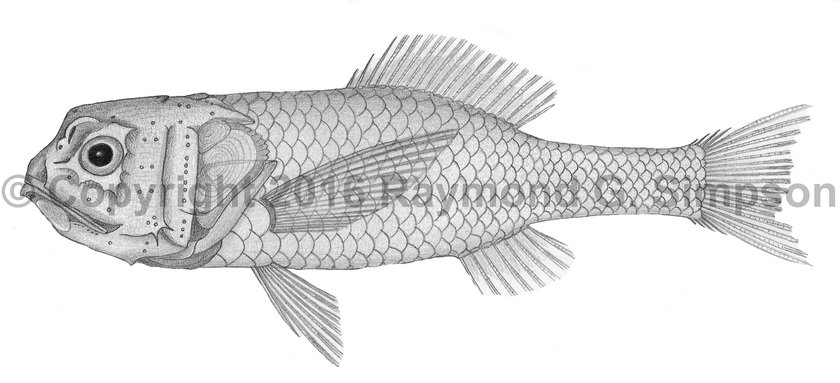
Common Name
Inconspicuous Bigscale
Year Described
Kotlyar, 2015
Identification
Dorsal Fin: III, 15-16
Anal Fin: I, 8
Pectoral Fin: 15
Pelvic Fin: I, 7
Caudal Fin: 9-10 branched, 4 procurrent rays
Lateral Scale Rows: 31-34
Gill Rakers: 18-19
Vertebrae: 26-28
Head with numerous bony ridges and pits. No post-temporal spines, projecting anterior spines, or raised bony crest on top of head. Eye diameter equal or greater than suborbital bone.. Preopercle with two spines at angle. Opercular margins relatively smooth or with weak spination. Gill rakers in first arch relatively few (19 or less). Anal fin origin before, under, or after last dorsal ray. Pectoral fin reaches last ray of dorsal fin. Pelvic fin origin under or slightly rearward of pectoral fin origin. Body scales large and easily shed. Four scales on gill cover. Spur absent on first haemal arch of caudal vertebrae.
Color
Body uniformly dark to black.
Size
Maximum size to 25mm SL.
Habitat
Mesopelagic from 175-1600m.
Range
Known from the northwestern Atlantic well offshore in the Sargasso Sea region. Specimen collections north of the Antilles and near Bermuda. One collection in the NE Atlantic east of the Azores.
References
Kotlyar, A. N. 2015. Revision of the genus Melamphaes (Melamphaidae): 2. Oligo-Raker species: M. longivelis Parr, M. inconspicuus sp. n., M. kobylyanskyi sp. n. Journal of Ichthyology, v. 55 (no. 3): 311-318.
Other Notes
Distinguished from Melamphaes longivelis in the oligo-rakered complex by lower dorsal ray and vertebral counts.
An unpublished species description for “Melamphaes indicoides” in Keene (1987) and Bartow (2010) appears to indicate either M. polylepis, M. falsidicus_, M. inconspicuus or an undescribed species. Meristic values most closely match M. inconspicuus, and M. indicoides may be describing large individuals of the former.